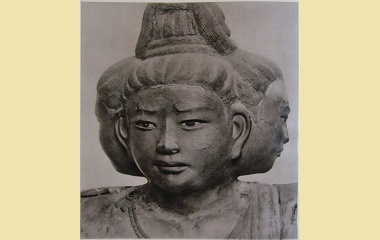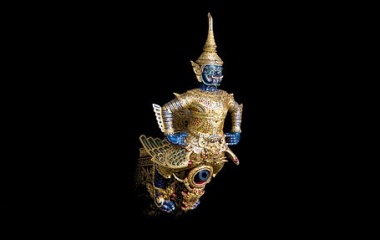What is an Asura?
Asuras are spirits found in Buddhist and Hindu cosmology. They are usually portrayed as power-hungry and lusty. Even the best of the Asura can be unpredictable and prone to mood swings, which makes them risky friends and dangerous enemies!
Characteristics
Physical Description
Asuras are sometimes classified as demons, and they have the appearance to match! Their skin is deep red or blue-green, and their hair is inky black. Four to six arms sprout from their bodies, as well as three heads, with faces pointing in opposite directions. They are fond of fine clothing: silk skirts with golden sashes and fringes, gold bands around their arms, bejeweled collars and elaborate helmets.
Personality
Although they are more powerful than humans, the Asura are the least powerful—and least noble—of the deities. Their low rank means that they are envious of the other gods and, at the same time, easily insulted if they are not praised for the powers that they do have.
Above all else, the Asura are moody and unpredictable. For example, when Sakra became ruler of the earth, the Asura celebrated his rise to power by drinking huge quantities of potent liquor. While they were drunk, Sakra ordered that they be removed from his presence, and when the Asura sobered up, they were so offended that they declared war against the new ruler.
Still, the Asura are not all bad. On one hand, they experience pleasure as deeply as negative emotions, which makes them highly romantic lovers and fun friends. Many Asura have poured their passionate emotions into religion as well, becoming loyal practitioners and even priests. They make sacrifices, perform cleansing rituals, build temples, and make holy pilgrimages with great enthusiasm.
Hindus have divided the Asura into two groups: the good adityas and the evil danavas. Hindu texts also explain that an Asura who practices good acts can reach the next level among the gods, transforming into a asura-deva.
Because of their volatile emotions, Buddhists consider the Asura to be one of the “four unhappy births,” meaning that being reincarnated as an Asura is as bad as being reincarnated as an animal.
Special Abilities
As gods—and highly individualist gods at that—the Asura’s powers are almost as unpredictable as their emotions. They are known for performing wondrous miracles as well as waging nasty battles. They can fly, shapeshift, cast spells and charms, turn wild animals into slaves, and much more.
Female Asura, known as Asuri, are especially famous for the charms they can work with plants. One legend explains that the Asuri created a plant which could cure leprosy, another that they created powerful love potions with herbs.
Famous Asura
Andhaka
One morning, Shiva (the Hindu creator god) was meditating on a mountaintop. His wife, Parvati, was in a playful mood, so she crept up behind Shiva and covered his eyes with her hand. Immediately, darkness fell over the world and Parvati’s hand began to sweat from the intensity of Shiva’s gaze. Her sweat fell onto the mountain, and a blind boy sprang from the earth. Parvati was horrified by the boy, but Shiva insisted that the child was their son and must be kept alive. They named the child Andhaka.
Days passed and Parvati wept over the hideous child she had produce. Then, a demon king approached Shiva and begged for a child, since he had none. Shiva was pleased by the demon’s humility, and he gave Andhaka to him to raise as his own. Accordingly, Andhaka learned all the ways of the demons and, when his foster-father died, inherited his kingdom.
But the inheritance didn’t go over smoothly. The demon king’s blood relatives rejected Andhaka, saying that he wasn’t a true member of the family, and drove him into a deep forest outside of his kingdom.
In the gloomy darkness of this forest, Andhaka struggled to come up with a way to regain his kingdom. At last, he decided he would call upon the god Brahma for help. He fasted for many days and nights, but Brahma was still aloof. At last, Andhaka was driven to desperation, and in the darkness of the forest, he began hacking at his own arms and legs, begging Brahma to notice him.
Brahma appeared to look upon the bloody Andhaka, and he was pleased by his devotion. He decided to grant Andhaka two gifts. The first gift was something Andhaka had longed for all his life—he asked for his blindness to be cured so that he could see. This was done, and Brahma could see the green trees that he had only ever known by the touch of fluttering leaves, could see the bright birds that he had only known by their songs. He was overjoyed! If this miracle was possible, everything else must be possible as well—so he asked Brahma for invincibility.
Brahma denied the request, telling Andhaka that all things that are born must die. However, he would allow Andhaka to choose the condition of his death, so the young king declared that he would only die if he lusted for a woman who had been like a mother to him. Brahma granted this.
Andhaka spent the next few years reclaiming his kingdom, conquering surrounding lands and part of the heavens, and growing wealthy. His name became known—and feared—all over the world, for he hadn’t forgotten the lessons the demon king had taught him. At last, he bragged to his minister that his success was complete. No one could match his strength, his majesty, his riches.
But—the minister replied—Andhaka didn’t possess a beautiful woman.
Soon after, Andhaka was riding through his kingdom with his army. He came to a beautiful mountain and decided to rest there, sending out some of his generals to scout for enemies. When the generals returned, they had a strange story to tell: they had found an old hermit meditating in a cave, and beside him was a dazzling woman.
Andhaka ordered them to bring the woman to him, but the hermit refused to let her go. When the generals reported this to Andhaka, he was enraged, and he decided to go fight the hermit himself. He expected an easy victory, but to his surprise, he was met by an army that he couldn’t defeat.
The fight went on for five hundred years, with other gods joining in to support the hermit. All the while, Andhaka thought he would win. He was, after all, invincible. What he didn’t know was that the beautiful woman he was fighting so hard to claim would be the death of him; she was his own mother, Parvati.
At last, the hermit, Shiva, and Andhaka met each other in battle. Shiva managed to stab Andhaka many times with his trident, but wherever the king’s blood fell, new copies of him sprang up. Shiva ordered his servant to drink the blood before it could fall, and in this way, he finally managed to kill Andhaka and finish the centuries-old war.
Bhasmasura
Bhasmasura was a religious zealot, incredibly devoted to the great Shiva. After years of worshipping Shiva, Bhasmasura decided that he wanted to meet the god and ask a gift from him. He performed a long penance, starving himself and having his servants whip him, until Shiva was pleased and descended from the heavens to hear his plea.
Bhasmasura was awed by the presence of Shiva, but he didn’t forget the gift he wanted. He asked for a special power: whenever he held his hand to someone’s head, that person would burn up. Unusual as it was, Shiva granted his loyal follower this request.
But the exchange took a quick turn for the worst, when Parvati appeared to ask her husband, Shiva, a question. Instantly, Bhasmasura was consumed by desire for Parvati. He decided to put his new power to the test by trying to burn Shiva up, so that he could claim Parvati for himself.
Shiva dodged out of the way just in time, but Bhasmasura kept chasing him. Eventually, Shiva managed to run to Vishnu, and the two gods came up with a plan to defeat Bhasmasura.
When Bhasmasura caught up, he was encountered by a gorgeous woman, such a sensual beauty that he forgot all about Parvati. He asked this new beauty to marry him, and she said she would, but only if he could copy her exact movements in a dance. She swayed her hips, and Bhasmasura swayed his. She twined her hands together, and Bhasmasura did the same. After several minutes of hypnotic dancing, she put her hand on the top of her hand. Without a second’s hesitation, Bhasmasura did the same and burned to a crisp.
Then the beauty transformed back into Vishnu, Shiva came out from hiding, and the two gods had a laugh together.
Vritra
Vritra was the ruler of the bad Asura. While on earth, he took the form of a huge dragon and prevented major rivers from flowing. His presence caused droughts, suffering, and death all over India, until he was killed by the hero Indra with a thunderbolt made by the gods.
Cultural Representation
Origin
In its earliest form, the word “asura” was a title, like lord, that could be used to describe any noble person, from kings to priests to gods. Later, “asura” evolved to mean any divine being, good or bad, orderly or chaotic. In the Vedic-Samhita, Hindu’s most ancient text dating back to 1500 BCE, “asura” had these two meanings.
Later, “asura” began to develop an evil connotation, perhaps because Asuras were associated with newer religions, while Devas continued to be associated with Hindu tradition. The Purana and the Shiva Sutras, dating back to the 3 CE and 8CE, refer to Asura as a special category of gods, usually destructive and chaotic.
Eventually, the Buddhists picked up the Hindu Asura and incorporated it into their own cosmology. They described Asura as the lowest of the gods, ill-mannered and undesirable.
Modern Appearances
In addition to their place in the Hindu and Buddhist faiths, the Asura have also worked their way into modern day fiction. They are especially popular in video games, where their quick temper and six sword-wielding arms make them difficult opponents for the hero to overcome. Final Fantasy, The Elder Scrolls and Dungeon Fighter Online all feature Asuran characters. They also made an appearance in the popular sci-fi movie, Stargate Atlantis.










